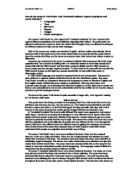Rachael Elliott 11D.
How Do The Two Poets Highlight
The Difficulties Of Living
In A Different Culture?
In the two poems ‘Unrelated Incidents’ by Tom Leonard and ‘Half-Caste’ by John Agard the obvious connection is the language is written phonetically to emphasise the dialect and contrast in culture to the real English language. In order to convey their opinions on the prejudices they face they take an almost humorous approach to ridicule their opposers.
Both the poets’ use of punctuation means that when spoken aloud there is an aggressive tone as in ‘Unrelated Incidents’ there are no capital letters, this emphasises the ‘wrongness’ of his dialect. He pokes fun at the way people would presume that news given by someone who doesn’t speak with a ‘voice of authority’ is lying, it is clearly wrong and he shuns this assumption:

This is a preview of the whole essay
Peer Reviews
Here's what a star student thought of this essay
Quality of writing
The Quality of Written Communication is fine. There is no cause for concern with regards to any of it, and grammar, spelling and punctuation are all kept nicely in check throughout the answer.
Level of analysis
The Level of Analysis here is very good, although in many respects it only targets the language of both the poems, and I would like to see a broader range of analysis such as analysis of imagery and structure too. Where I like the candidate's analysis is when they consider the context of the poem and recognise the poet's intentions for the poem, particularly in Leonard's case. This astute analysis shows external research into the purpose behind the poem and this is something examiners love to see. However, the comparison of this answer on the whole is weak, and feels quite often like a separate analysis of two different poems. By this I mean the candidate takes the Poem-by-Poem approach, rather than Point-by-Point. In the latter analytical structure, candidates identify one feature of either poem, comment on whether it's a similarity or difference and then go on to analyse it, naturally encouraging more comparison than commenting all they can on one poem and then the other, as this style limits explicit comparative points.
Response to question
This is a fine example of an essay answer to a question focused on language. I wouldn't mind see a bit more range in the analysis, particularly on the imagery conjured in Agard's 'Half-Caste', but nonetheless what is written about the language is illuminating and engaging throughout. I like the use of language the candidate has used, as it's higher register shows the examiner a candidate who is comfortable in using complex lexes when analysing poetry. The concluding paragraph could do with a little extension, but as before, what is written is still very good and this candidate could expect to receive a high B grade for GCSE.








